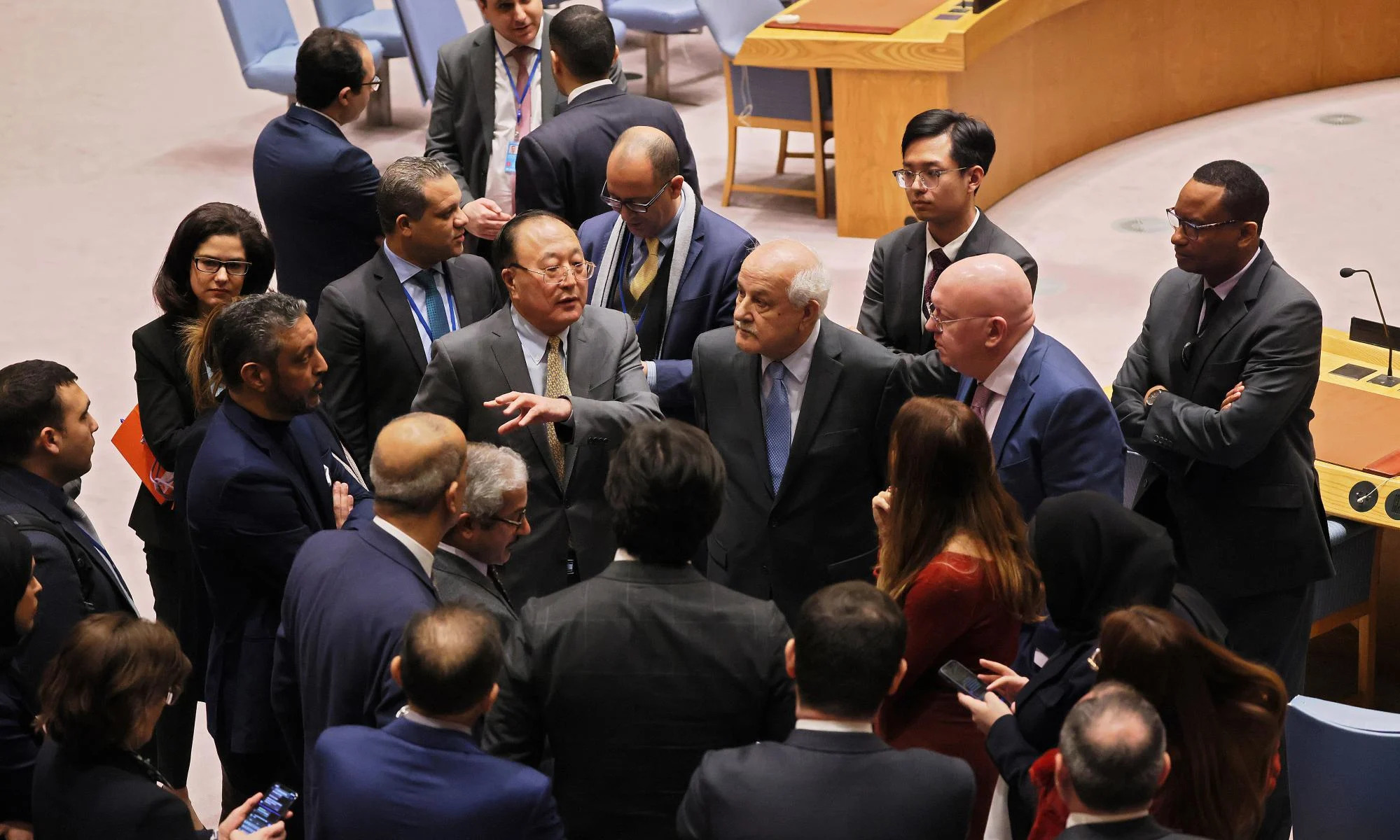China warns against more casualties as Security Council again delays Gaza vote

China reiterated its condemnation of Israel's actions against Palestinians in Gaza and the West Bank, warning that more civilian casualties would "not help security or rescue hostages", as the UN Security Council delayed another resolution calling for a ceasefire and humanitarian access.
"There is no reason for any country to hesitate in the face of this draft resolution," said Zhang Jun, China's permanent representative to the UN, at the council's Tuesday meeting. He urged "concerned members" to support "swift and meaningful action to save lives".
Zhang said a ceasefire remains "the overriding prerequisite", adding that the Security Council must "play its due role and take action ... to restore peace and uphold justice".
The draft resolution, raised by the United Arab Emirates, was delayed after days of negotiations. Similar resolutions have been overturned multiple times since the Israel-Gaza war erupted.
The US vetoed two resolutions in October and early December. China and Russia vetoed a resolution drafted by the US in November which required all parties to condemn the October 7 Hamas attack on Israel.
The Security Council - which approved one resolution in November, for a short-term truce and humanitarian access to Gaza - will attempt to hold another vote on the issue on Wednesday.
According to the region's health authority, the death toll in Gaza is approaching 20,000, with more than 50,000 people injured and displaced, with minimal healthcare services working.
Israel's military says it has killed some 7,000 militants in the Gaza ground offensive, with the loss of 131 of its soldiers.
Zhang condemned in strong terms Israel's actions in Gaza, as well as its settlement activities and "violence" towards Palestinians in the West Bank.
"Israeli bombardment and shelling continue. Schools, hospitals, mosques, Christian churches and refugee camps have been repeatedly targeted in military operations, and there is no justification for such attacks," he said.
"Violence by the Israeli army and settlers in the West Bank has also intensified. Searches, arrests and raids against Palestinians are occurring on a daily basis with appalling frequency and intensity and have resulted in a large number of Palestinian casualties."
Beijing supports an independent Palestine based on the pre-1967 borders, which would require the dismantling of all Israeli settlements in the West Bank, which have been steadily expanding in the areas under Israel's administration.
Around 60 per cent of the West Bank is Israeli-controlled since the region was divided into three under the Oslo Accords in the 1990s. The Palestinian Authority - set up as an interim governing body for a future state - has sole control of less than 20 per cent.
"Settlement activity has eroded ... the basis of a two-state solution. We urge Israel, as an occupier, to fulfil its obligations under international law, cease all settlement activities, effectively curb settler violence and end impunity," Zhang said.
Biden administration policy differences reportedly behind delay in Gaza ceasefire vote at UN
A vote on a Gaza ceasefire resolution was postponed for a second time at the UN security council on Tuesday, amid reported policy differences inside the Biden administration.
While diplomatic efforts struggled in New York in the pursuit of a formalised truce, there was a renewed push for a new hostage deal that would involve a short humanitarian pause in the fight to allow an exchange with Palestinian prisoners.
The UN draft resolution, drafted by the United Arab Emirates, had been changed on Tuesday in an effort to avoid a third US veto since the conflict began more than two months ago. Instead of calling for an “urgent and sustainable cessation of hostilities,” the amended text referred to “the urgent suspension of hostilities to allow safe and unhindered humanitarian access, and for urgent steps towards a sustainable cessation of hostilities”.
According to diplomatic sources, the US mission in New York believed it had negotiated a text that it could at least abstain on, but when Washington was consulted, new objections were raised, with the White House reportedly taking a more pro-Israel line than the state department.
The White House objections included opposition to any mention of the word “cessation”, unease over a clause that puts the UN in charge of monitoring the flow of humanitarian aid without explicitly mentioning Israel’s role in checking cargo entering Israel, and the absence in the draft resolution of a condemnation of Hamas for its 7 October cross-border attack on Israeli communities, which killed about 1,200 people.
As consultations between New York and Washington continued, a vote on the UAE resolution was put off until Wednesday morning at the earliest.
“We’re still working through the modalities of the resolution,” the White House national security spokesperson, John Kirby, said. “It’s important for us that the rest of the world understand what’s at stake here and what Hamas did on 7 October and how Israel has a right to defend itself against those threats.”
Lana Nusseibeh, the UAE ambassador to the UN, said: “Ultimately, the endpoint is a ceasefire, but as you know, that was not adopted recently, so we have to move to the space that allows humanitarian workers to work safely and at scale.”
Meanwhile, there were new efforts under way to revive a hostage-for-prisoner swap that produced a weeklong pause in the fighting at the end of November. A meeting on Monday in Warsaw, between Qatar’s prime minister Mohammed bin Abdulrahman Al Thani, the Mossad chief, David Barnea, and the CIA director, William Burns, was described as “positive” but not decisive. During an earlier negotiated pause in hostilities Hamas released 110 women, children and foreigners it was holding in exchange for 240 Palestinian women and teenagers being held in Israeli jails.
“The talks were positive with negotiators exploring and discussing different proposals in an attempt to progress on negotiations,” Reuters quoted an unnamed source as saying, but the source added: “An agreement is not expected imminently however.”
The Qatar-based political head of Hamas, Ismail Haniyeh, was expected in Egypt on Wednesday to talk to security officials there about another hostage swap deal, and Israel’s president, Isaac Herzog, confirmed Israel’s interest in a revived hostage deal.
“Israel is willing to enter another humanitarian pause and bring in additional humanitarian aid in order to bring back the hostages, so the entire responsibility for this issue lies with Sinwar [the Hamas leader in Gaza] and his people,” Herzog told the Washington-based Atlantic Council thinktank on Tuesday.
But the Israeli president also made clear that Israel would contemplate a humanitarian pause in the fighting only in the context of a hostage deal.
If Hamas rejected the deal, he said, Israel would continue its offensive on Gaza “with no limitations.”
- Questions and Answers
- Opinion
- Story/Motivational/Inspiring
- Technology
- Art
- Causes
- Crafts
- Dance
- Drinks
- Film/Movie
- Fitness
- Food
- Games
- Gardening
- Health
- Home
- Literature
- Music
- Networking
- Other
- Party
- Religion
- Shopping
- Sports
- Theater
- Wellness
- News
- Culture
- War machines and policy


